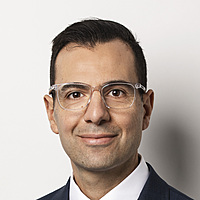7 transformative shifts from 2024 that could shape the year ahead
It’s that time of the year again, when fund managers down tools to reflect on the big themes of 2024.
As it turned out, 2024 was a remarkable year for financial markets. The resurgence of animal spirits propelled technology stocks and Bitcoin to dizzying new highs, leading to extreme valuations in parts of the market.
Quality businesses led by astute management teams thrived, while weaker companies —exposed to a slowing economy or poor management were savaged.
This year was marked by transformative shifts such as:
1. The rapid rise of Artificial Intelligence (AI).
2. Animal spirits and market euphoria.
3. A return to Trump-O-Nomics.
4. Chronic housing shortages.
5. The persistent slowdown of China’s economy.
6. Increasing industrial action.
7. The ascent and decline of several founder-led CEOs.
Australian bank shares outperformed, driven by the meteoric surge of Commonwealth Bank of Australia (CBA). This performance mirrored the Australian Property Index, which hit record highs despite rising delinquencies and cost-of-living pressures.
We are first to profess we did not foresee some of these market outcomes, particularly the outperformance of Australian banks and the resurgence of dot-com-style valuation metrics for ASX technology stocks.
As Annie Duke, author of Thinking in Bets, puts it, life and financial markets are shaped by uncertainty, risk, and an element of luck.
Successful investing is less about predicting outcomes and more about making informed decisions amidst ambiguity.
While outcomes are important, the quality of decision-making is what defines long-term success. The more comfortable you are with uncertainty, the more objective you can be with decision-making, (hopefully) leading to consistent risk adjusted returns.
Much like the annual Spotify Wrapped review (Some credit is owed to my tween daughters in helping me clock 62,517 minutes, a top 3% global listener), the year’s end is an opportune time to evaluate our choices, reflect on how we managed uncertainty, and consider the road ahead for 2025.

1. Artificial Intelligence (AI): The Rise of the Machines
Artificial Intelligence hit fever pitch in 2024.
Google DeepMind’s CEO, Demis Hassabis, announced an ambitious $100 billion investment in AI tools, and OpenAI’s valuation soared to $157 billion. These pivotal moments signaled a renaissance in business innovation driven by generative AI.
Throughout the year, many ASX companies highlighted diverse AI applications:
- Rio Tinto (RIO): Is using AI to analyze historical exploration data, boosting geologists’ efficiency in decision-making.
- Commonwealth Bank (CBA): Applied AI to resolve 15,000+ transaction disputes and handle customer messages via its app.
- Suncorp (SUN): Deployed AI to summarise claims progress for customers and customer support staff, overcoming limitations of legacy technology.
- Sonic Healthcare (SHL): Leveraged AI for faster disease diagnosis and detection.
- IT Services: AI is being deployed to write HR policies, review and summarize legal agreements and streamline request for proposals (RFP’s).
These examples highlight AI’s tangible use cases, which are set to expand.
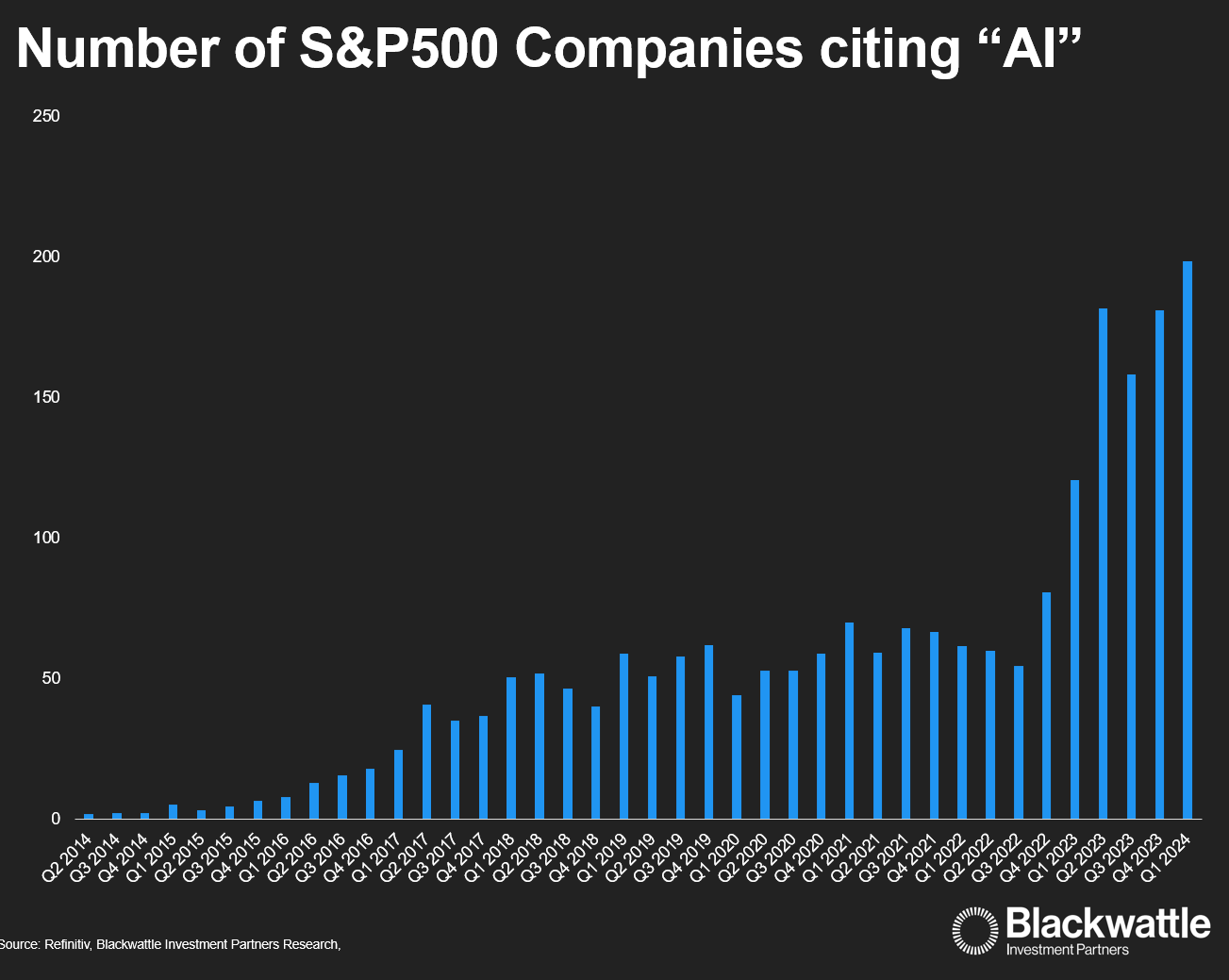
Companies like Goodman Group (GMG) and Infratil Limited (IFT) stand to benefit from rising demand for data centres. GMG is at the forefront of data centre development owing to its bank of land and secured power, highlighting managements excellent foresight.
Firms with rich data sets—such as News Corporation (NWS) and Life360 (360)—are poised to monetize their assets, as AI platforms require immense data for training for generative AI applications.
Additionally, energy generators such as Origin Energy (ORG) are positioned well, due to increased electricity demand from hyperscale developments and EV adoption.
Globally power shortages are a recurring theme, where data centres are already accounting for 20%-25% of electricity demand in places like Virginia and Ireland.

2. Animal Spirits – Confidence Revolves Around Stories
Human emotion and changing investor expectations is a significant driver of share prices. Add to this the evolving ownership structure of equity markets, where price setting by Active Management is evolving into the sequel to “The Death of the Salesman”.
As the chart below shows, market prices are increasingly being set by passive investment flows, thematic ETF’s and larger wholesale pools of money.
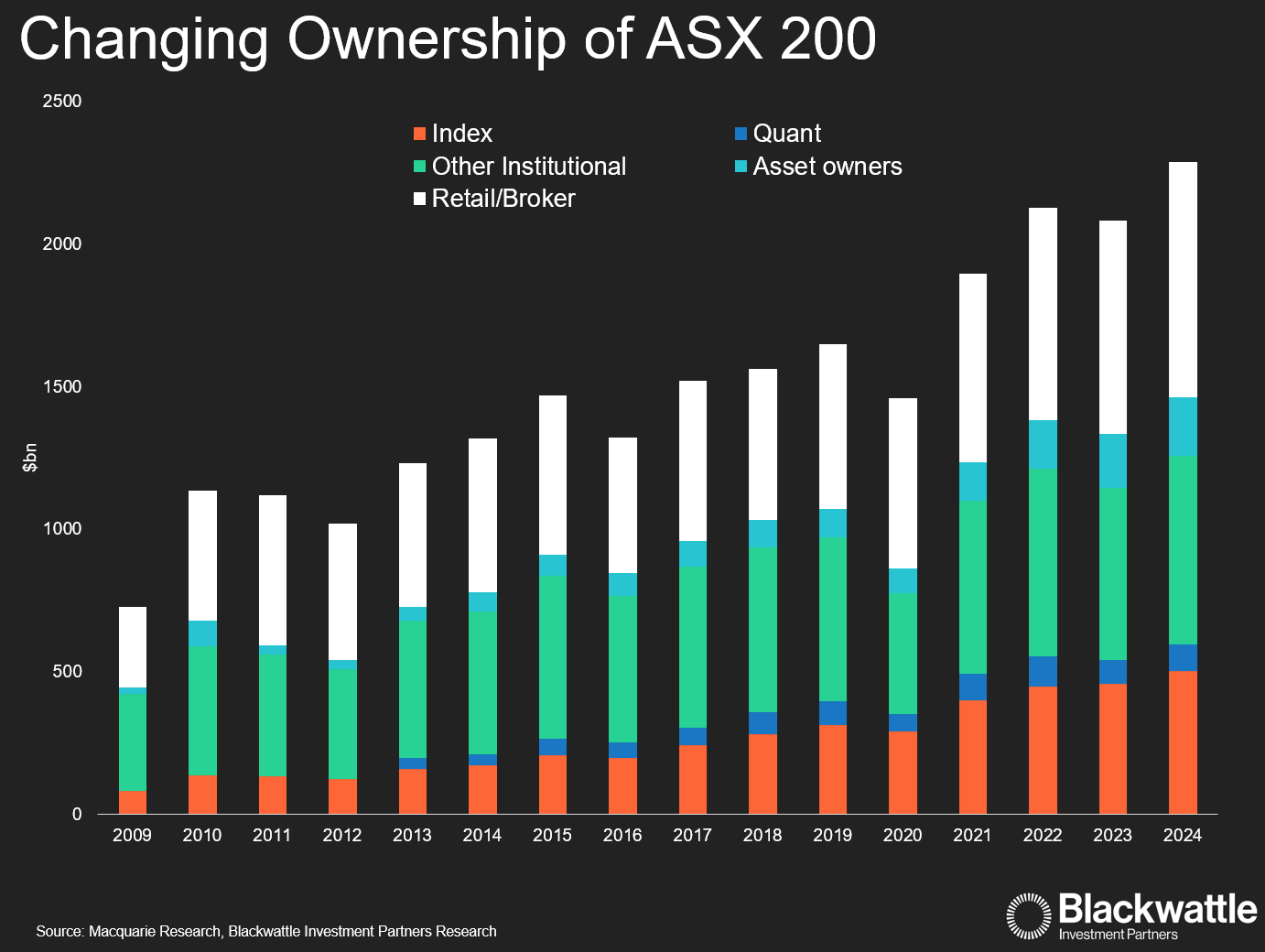
Index changes and the growth of momentum investing is having a disproportionate impact on company valuations.
The case in point was Life360 (360)’s market cap increasing by 20% ($0.9bn) upon Russell 2000 index inclusion, only to have that decision reversed shortly after, eroding gains.
2024 has seen some extreme changes to sector valuations. Technology and financial valuations are trading at twenty-year highs, and valuation gaps between dual listed companies such as Rio Tinto Limited (RIO) and Rio Tinto PLC (RIO.L) have continued to widen.
The surge in Commonwealth Bank (CBA) shares, which wrong footed most managers including us, now makes it the most expensive bank in the world.
CBA’s 1 year forward PE of 26x is 3.3 standard deviations above its historical mean, a statistical measure of extreme valuation or, put simply, irrational exuberance.
If one was to contrast CBA’s income yield and growth relative to the Australian 10-year bond rate, investors are locking in a negative investment return.
Rising delinquencies is also typically ominous for lenders.

Strong markets have led to the reinvigoration of merger and acquisition activity (Queue on Spotify – Ini Kamoze – “Here comes the hot stepper, I’m the miracle banker”.)
Total deals announced and pending amount to over $50bn in 2024. IPO activity was turbo charged by high profile listings of Chemist Warehouse’s merger with Sigma (SIG) and Guzman Y Gomez (GYG).
Based on the merger terms and prevailing Sigma share price, Chemist Warehouse’s implied market value is now $31bn pending the issue of shares to vendors in 2025. Credit goes to the founders, however the market value now implies over 52x EBIT and three times the independent expert’s range of $9.5bn-$10.7bn in the scheme documents. ASX 100 inclusion and escrow arrangements is sure to see more buyers than sellers in 2025. That’s some miracle banking.
These microstructure trends will continue in our view, creating more market anomalies, further deteriorating market efficiency. While active management has suffered in recent years, the changing market structure further warrants the role of more decisive active managers, which we suspect will be evident in more sober times.
Market volatility, driven in part by shifts in market microstructure, is also fueling the growth of private capital and the trend of companies opting to remain private for longer.
Private ownership can be appealing to management due to greater flexibility to pursue bold restructuring initiatives and the ability to invest with longer-term investment horizons without the pressures of proxy advisors.
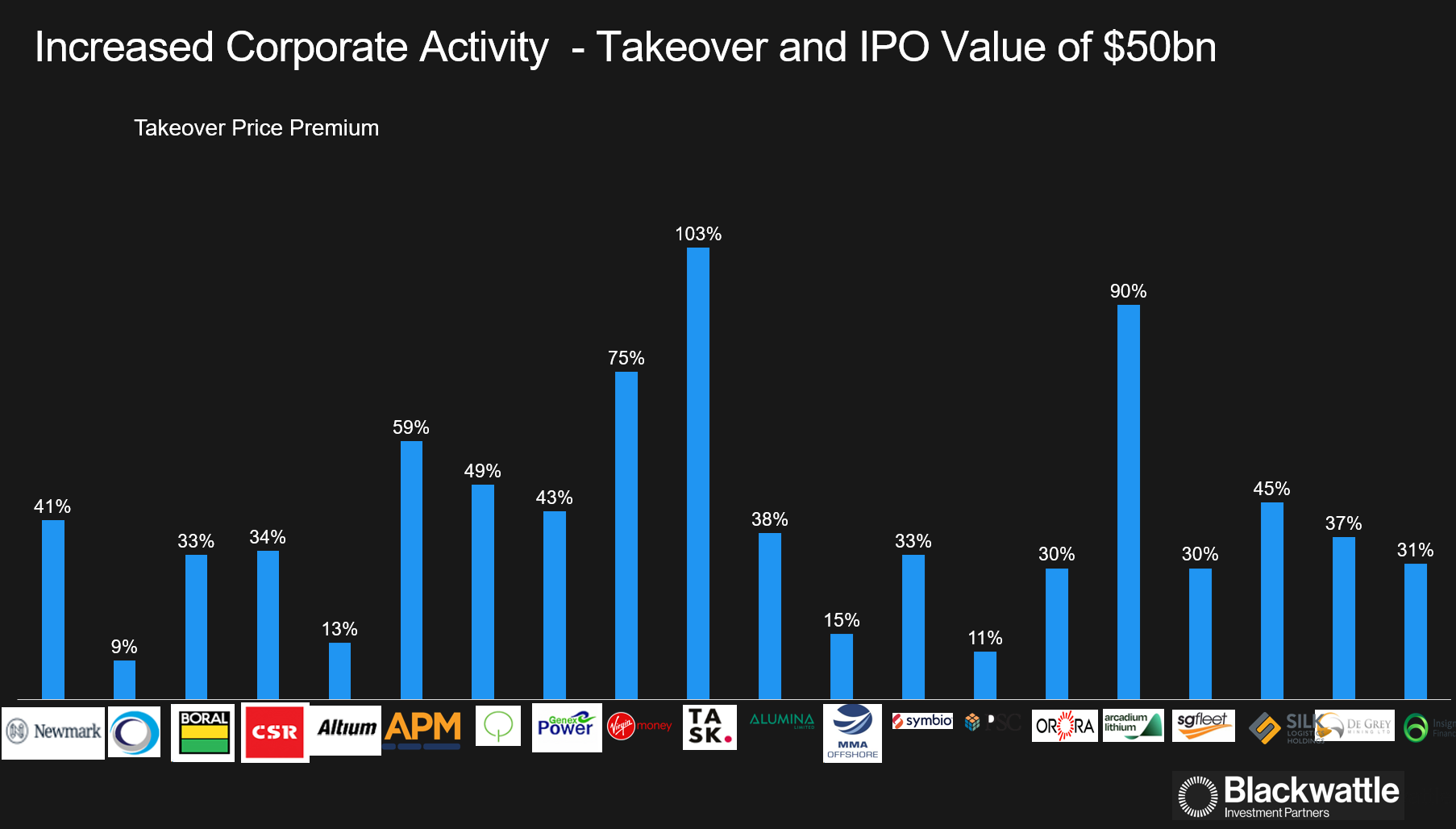
Takeover targets – who is next?
As interest rates decline and market valuations remain bifurcated, we anticipate an uptick in private equity and merger activity in 2025.
Underperforming companies that may be more suited to private ownership in our view include Domain Group (DHG), given strong industry fundamentals buffeted by a leadership vacuum and weakening housing markets and a depressed valuation.
Transurban (TCL)’s underperformance in the face of higher bond yields, a regulatory review into concession agreements obfuscates a network of high-quality long duration cashflows. Private capital would be well positioned to partner with Governments for more investment in toll road infrastructure.
Ramsay Healthcare (RHC)’s underperformance following years of global expansion, declining returns and industry pressure does warrant a change in strategy or breakup. Private capital owners may act more decisively, take a longer-term view of private hospital assets in world facing an aging population, recognizing the value of Ramsay’s freehold network of high-quality Australian assets.
Following its portfolio restructuring, Orora (ORA) has emerged as a global leader in beverage can and glass manufacturing. Its strong market position, combined with a net cash balance sheet, makes it an attractive target for global packaging companies seeking to expand their presence in these high-demand substrates.
ALS Limited (ALQ), a leading global provider of testing services, stands out as a strong candidate for potential consolidation by one of the major players in the testing and inspection industry, especially due to its strength in environmental and mineral assay services.
Companies we believe will likely make acquisitions include Wesfarmers (WES), given its growth mindset and willingness to expand into categories such as industrial, mining and healthcare.
Major resource companies such as BHP (BHP) and Rio Tinto (RIO) are likely to continue to diversify away from iron ore.
James Hardie (JHX) has also made clear its aspirations to expand its product range in the USA.
3. Trumponomics – “Tariff is the Most Beautiful Word”
A big moment for markets was when Trump swept through the US election, mainly on protectionist policies, deregulation and an anti-woke agenda.
Despite market concerns on “Trump-flation”, our thinking is that Trump is quite attuned to reducing cost of living pressure and inflation, increasing home affordability and job creation.
We believe Trump will be equally focused on disinflationary policies such as the fiscal deficit and Government expenditure reductions, as well as a roll back of inflationary energy transition subsidies.
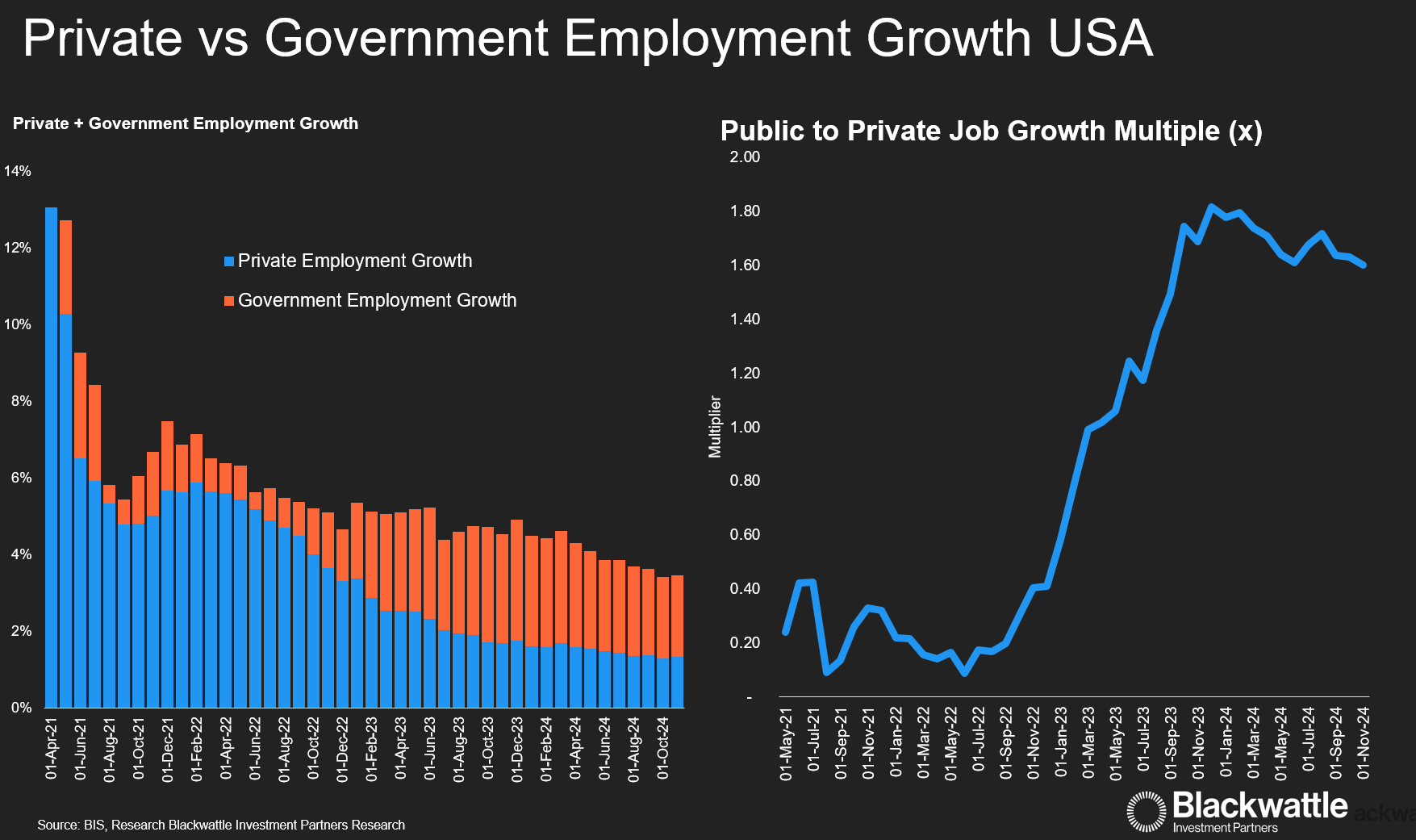
De-regulation of cumbersome environmental regulations and laws governing autonomous vehicles/robotics will be prioritized. Trump has made it no secret he intends to scale up oil and gas production, increasing global energy exports. We believe Musk’s ambitions to ramp production of autonomous taxis/trucks/robotics will also be deflationary in the long run.
Onshoring will gather more pace under the Trump administration, adding to the surge in private investment. We see Bluescope (BSL) and Worley (WOR) as beneficiaries.
Bluescope (BSL), which is well known for its Australian Colourbond product, generates over 50% of its earnings from North America. Its USA based steel mill, Northstar which has approx. 60% exposure to non-residential construction and manufacturing positions it well for these trends. Depressed steel margins also support higher prices.
Worley (WOR) is a leading engineering and design company that should benefit from increased hydrocarbon investment. One notable example is Venture Global’s CP2 gas export project (US$4bn), which has been struggling for approvals. Given the aging global plant and infrastructure within the energy sector, increased hydrocarbon investment under Trump positions Worley well.
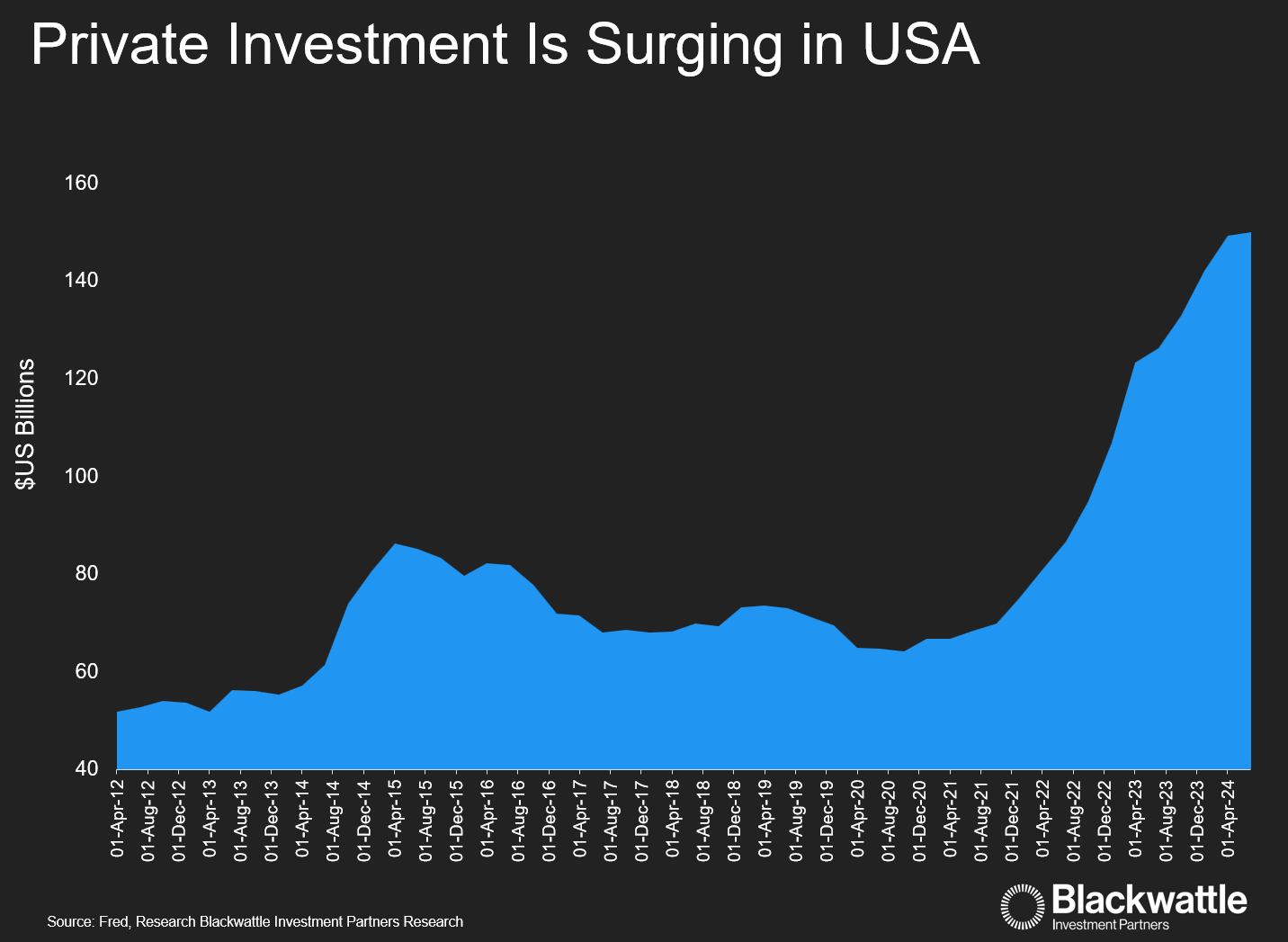
4. If You Build It, They Will Come: Chronic Housing Shortages
Housing shortages have reached critical levels in Australia and the U.S., driven by rising construction costs, surging immigration, and bureaucratic zoning delays.
Estimated shortages amount to 150K-200K units by 2027 in Australia, and anywhere between 1.5m-5.5m in the USA.
As the charts below show, new housing construction per 1,000 capita in both USA and Australia is below the long-term average.
What is more notable is the period of under build from 2003-2021 for USA, and 2003-2014 for Australia following post GFC and stricter lending criteria.

Solving this challenge will be difficult. As was the case in the USA election, housing will be a major voter concern in the upcoming Australian election. This should lead to more pro-housing policies in our view, which combined with falling interest rates, should stimulate new housing.
Within the USA, we believe James Hardie (JHX) and Reece Limited (REH) are best placed.
James Hardie is benefiting from the growth of fiber cement siding relative to other substrates. Fiber cement has superior aesthetic properties, which lead to better curb appeal, higher durability, and low maintenance. Management has been driving growth through contractor development, installer training, and increasing awareness of differentiating factors such as the ColorPlus range and fire-resistant properties.
Reece is another Australian global success story that is rapidly growing in the USA following the Morsco acquisition in 2018. Reece has made substantial progress with Morsco, having rebranded it to Reece following the roll out of the 'Reece Way' of doing business. With a market share of less than 5%, there is plenty of runaway for Reece to grow into the USA.
In Australia, we expect SGH Group (SGH) to be a beneficiary through its ownership of Boral. Under the leadership team of Boral CEO Vik Bansil, Boral has shown improvements driven by disciplined pricing, a focus on operational excellence, and efforts to unlock the full value of its extensive landbank. While the construction market is currently softening, we anticipate that the benefits of these operational improvements will become fully evident as the cycle rebounds.
5. A Bull in a China Shop: China’s Economic Slowdown
China’s economic slowdown has evoked comparisons to Japan’s lost decades.
Negative population growth, contracting money supply, and stagnant housing markets have compounded these concerns.
President Xi Jinping’s attempt to pivot the economy toward services and advanced manufacturing will take time, following years of housing-market-driven growth.
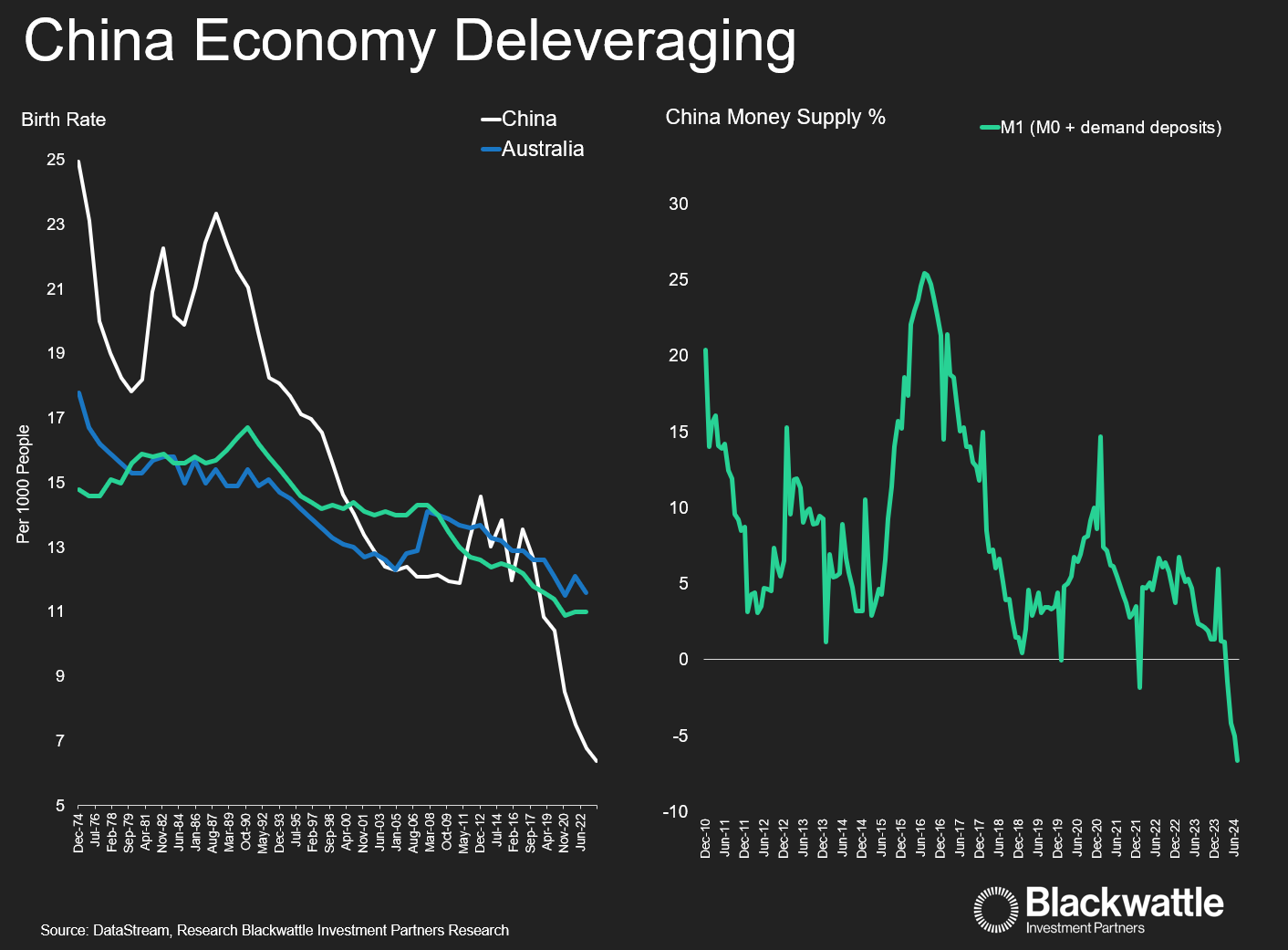
Iron ore demand—historically driven by China’s construction sector—has likely peaked. This follows years of investment in housing which accounted for as much as 15% of GDP, before policies were implemented to rein in housing speculation.
While recent stimulus announcements are encouraging, they appear to focus on stabilizing demand and clearing excess inventory, as opposed to a return to significant fixed asset creation.
Interest rates have fallen considerably, and further devaluation of the Yuan is likely.
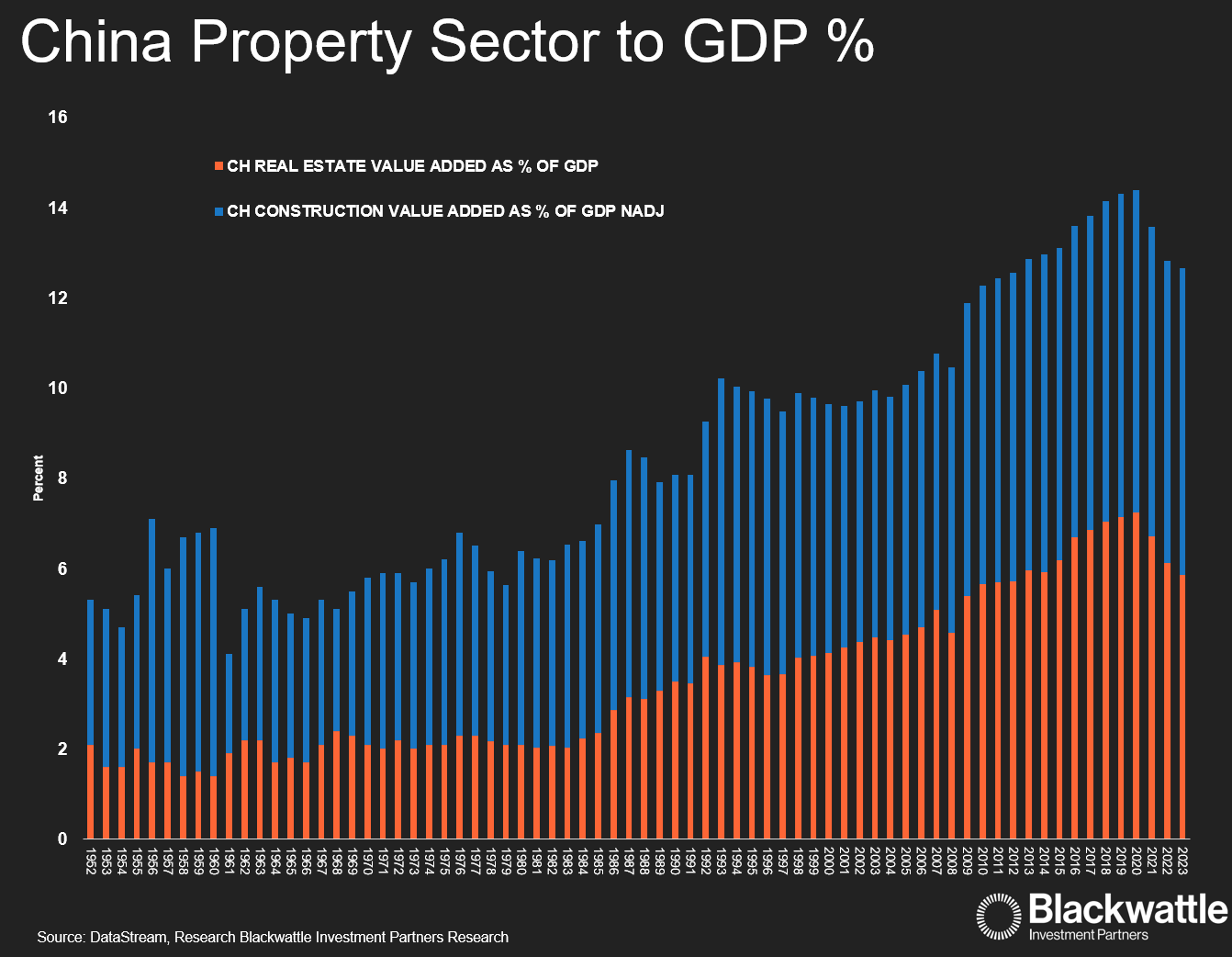
We believe Iron Ore prices will continue to drift towards the 90th percentile of $75/t-$80/t, particularly when supply ramps up from the Simandou project in Guinea. We favour commodities such as copper and alumina, where demand is tied to global industrial production and electrification, and supply growth is more limited. In this context, companies like South32 (S32) and Anglo American (AAL.L) are well-positioned.

Coking coal’s outlook is also favourable, supported by a dearth of supply investment, and growing Indian steel production. Whitehaven Coal (WHC) stands to benefit from this demand shift.
Depressed commodities such as Lithium and Manganese are also poised to improve in our view, given depressed prices are near first and second quartiles of the cost curve, and supply is being mothballed.
Within these commodities, IGO Limited (IGO) and Jupiter Mines (JMS) are well positioned for a recovery.
6. Power to the People: The Rise of Industrial Action
Cost-of-living pressures and industrial reform under a Labor government have driven union membership growth in Australia—the first increase since 2011.
Enhanced union delegate rights, industry-level bargaining, and enforced negotiations have contributed to a wave of strikes across sectors such as retail (Woolworths), healthcare (Ramsay Health), transport (Qantas) and media (Nine Entertainment).
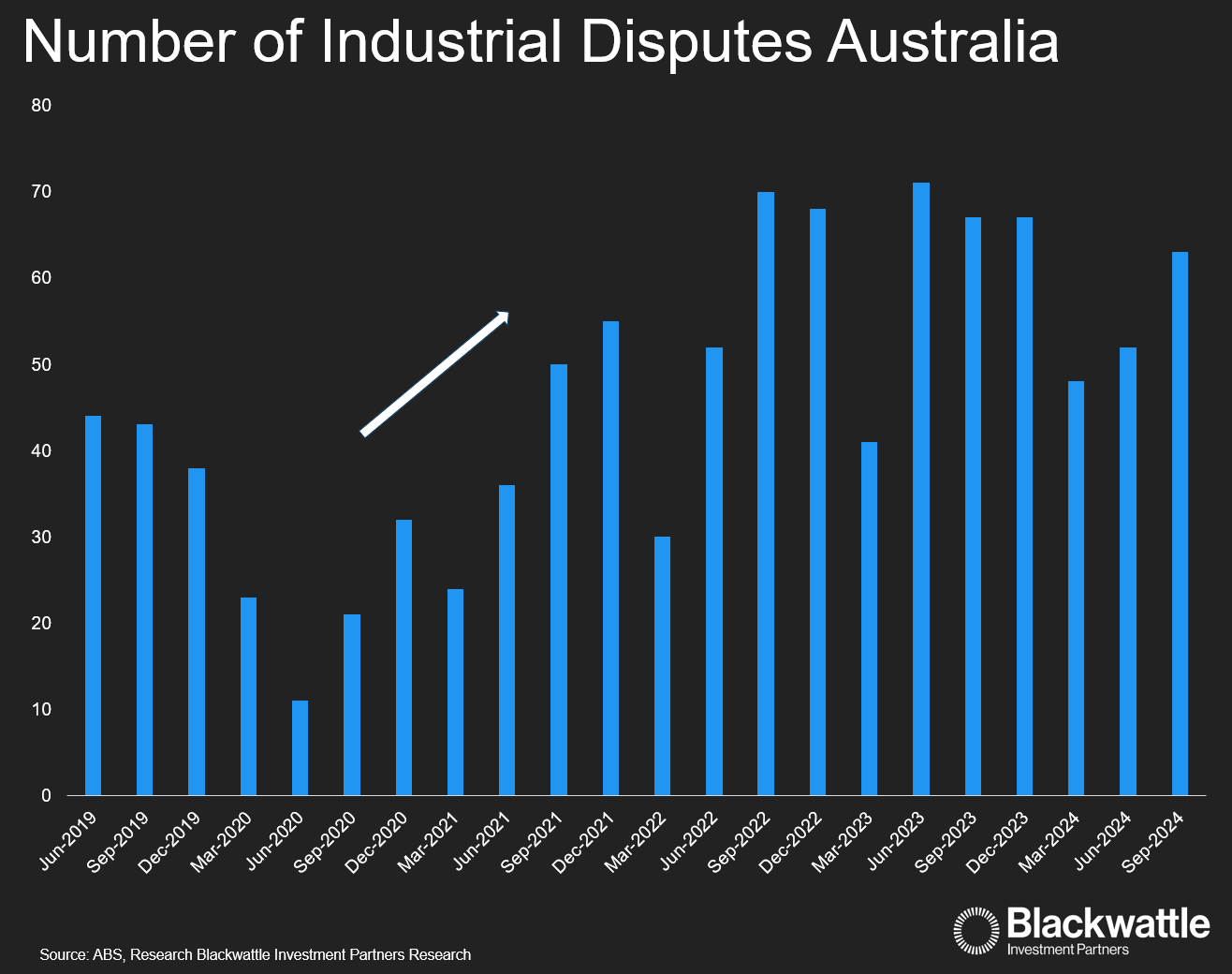
This phenomenon reflects global trends, where inflation has eroded workers’ earnings power while asset owners have benefited from rising prices. Strikes are becoming increasingly common, as experienced by BHP and South32 (S32) across their global operations.
Fast food operators have reported 15%-30% wage growth in places like France, Netherlands, New Zealand and California. Compounding this is an aging workforce, which is causing structural shortages in critical blue-collar trades.
Understandably, governments are enforcing higher minimum wages, particularly in low-skilled sectors. Gone are the days of 2-3% wage growth accords.
Companies with high labour costs relative to gross profit remain vulnerable under a Labor government in our view. This includes companies such as Woolworths (WOW), Coles (COL), Ramsay Healthcare (RHC), Aurizon (AZJ) and Cleanaway (CWY).
The May 2025 election will be critical; as a Coalition government would likely reverse some reforms, while a Labor win would aim to cement them.
7. Founder Led Companies – A Song of Ice and Fire
In 2024, revelations of governance breaches for certain ASX founder-led companies exposed critical leadership questions and board oversight.
Despite these failures, there is profuse evidence that founder-led companies have delivered above-average returns.
Most businesses have started with a visionary founder that had an idea and obsession to commercialise it. Not all succeed, but the ones that do tend to create significant value for shareholders.
To quote Daniel H Pink, an expert in behaviour and leadership psychology:
“There is a big difference between a CEO who comes through the ranks, and a CEO who is a Founder in terms of skills….to become a CEO of an organisation you have worked at for over 35 years compared to a CEO of venture funded start up or new idea requires different skill sets”.
Notable characteristics of founder-led teams include:
- Long term vision and intrinsic motivation
- Higher Investment in innovation
- Risk Tolerance and Strategic Decision Making
- Alignment
Our own Blackwattle Investment Partners Index of over 50 ASX founder-led companies has shown excess returns of 18% per annum compared with the ASX 300, including dividends.

Founder-led companies worth keeping a close eye on in 2025 include Premier Investments (PMV) – led by Chairman Soloman Lew, as he reshapes the portfolio to focus on higher growth brands Smiggle and Peter Alexander.
A similar strategy is unfolding at Newscorp (NWS) as asset divestments gather pace to realise shareholder value, increasing the prominence of faster growing digital businesses.
2025 will also be a juncture point for SGH Holdings (SGH) led by Ryan Stokes, as the company starts to deliver on the turnaround of Boral.
Within the faster growing businesses, we also point to Pinnacle Funds Management (PNI), Reece Limited (REH) and Life 360 (360) as these businesses gather momentum in their international markets, which offer decades of growth runway if management continues to execute.
Transitioning leadership for any company can be tricky. Our experience is when companies choose an outside successor, there can be disruption as the strategy is reset, cultural values are altered, and new management ranks are recruited, and stakeholder relations are rebuilt.
For non-Founder Companies, we tend to favour home grown management teams, as they preserve the strategy and stick to the core. This is evidenced by numerous successful transitions at Commonwealth Bank (CBA), Carsales (CAR) and Amcor (AMC).
Conclusion
As we move into 2025, the dominant themes of 2024 are likely to remain influential. However, it’s far from certain that yesterday’s winners will continue to lead, particularly given the stretched valuation metrics in some areas.
Annie Duke’s Thinking in Bets offers a valuable perspective: success in investing stems from a disciplined process rather than focusing solely on outcomes. Much like skilled poker players, investors must embrace uncertainty with informed decision-making, and not get carried away with emotion.
True investment success doesn’t come from attempting to predict the future but from positioning ourselves to adapt and thrive as it unfolds—ensuring the odds are always in our favour. In this spirit, we maintain a preference for companies with strong qualitative attributes and aligned management teams, while remaining disciplined on valuation.
Thats a wrap.
4 topics
16 stocks mentioned
